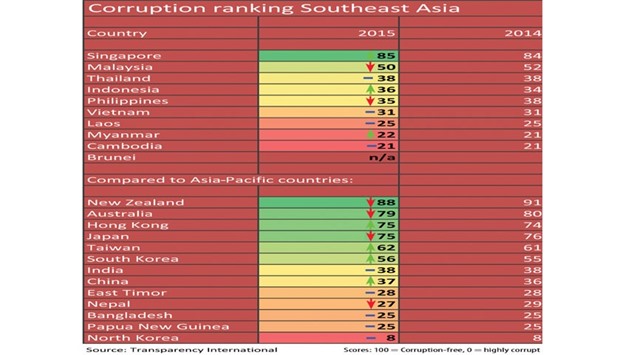The latest Corruption Perceptions Index 2015 released by Berlin-based graft watchdog Transparency International on January 27 shows that “tea money” remains an important requirement to grease business transaction and receive public services in Southeast Asia.
Overall, in the ten member countries of the Association of Southeast Asian Nations, or Asean, only three improved in the index where the highest score of 100 indicates a corruption perception of “very clean” and the lowest of 0 “highly corrupt.”
Singapore, Indonesia and Myanmar improved their scores slightly in the ranking, whereby Singapore remains very prominently placed in the list of least corrupt countries in the world, but, overall, in 2015 fell to eighth from seventh in the previous year.
Ahead of it in the ranking are now Denmark, Finland, Sweden, New Zealand, the Netherlands, Norway and Switzerland.
Indonesia’s score made a two-notches leap to 36, still not very high on the overall list of corruption-free countries, but seemingly a slight success due to increasing attempts to weaken graft by the country’s Corruption Eradication Commission.
However, given the worldwide average index of 43, Indonesia’s score to some extent still indicates weak or ineffective efforts to counter corruption, Transparency International Indonesia researcher Ilham Saenong noted.
Myanmar also improved, but only by a single notch to a score of 22, which means it remains among the world’s most corrupt countries, at a global rank of 147 out of 168 countries surveyed and alongside nations such as Zimbabwe, Burundi, Congo — and Cambodia, which remains Southeast Asia’s most corrupt country on Transparency International’s 2015 ranking, placed at 150th out of the 168 countries globally and boasting the lowest regional score of 21. Preap Kol, executive director of Transparency International Cambodia, said the country’s poor score can be mainly attributed to persistent and rife corruption in the judicial system. However, “if we look at the investment and commercial climate, it has improved,” he added.
The Philippines slid the most in the new corruption ranking to a score of 35 from 38, placing it now on rank 95 of the global corruption list between Mexico and Bolivia, down from rank 85 in 2014 and despite an anti-corruption drive by the Aquino government over the past three years. Commenting on the outcome, Transparency International noted that this year’s poor results for the Philippines “demand that leaders revisit the genuineness of their efforts and propel the issue beyond stagnation. They must fulfil promises and ensure that efforts aren’t undermined in practice.”
The corruption scores of Vietnam and Laos remain unchanged, both continuing to occupy not very flattering ranks which indicates that corruption is still widely rooted in both communist nations.
In turn, the unchanged score of Thailand is remarkable because the junta declared the fight against corruption one of its main crusades since it took over power in 2014.
However, Thailand retained a low score of 38 and could probably get challenged and over taken by Indonesia if anti-graft efforts fail to materialise in the future in the Kingdom. In the global corruption ranking, Thailand currently shares its rank 76 with India, Brazil, Burkina Faso, Tunisia, Zambia and Bosnia-Herzegovina, but at least stands one notch above China.
Malaysia, on its part, despite improving from a score of 49 in 2012 to 52 in 2014, fell back to 50 in 2015. The drop is widely linked to issues surrounding state-owned investment fund 1Malaysia Development Bhd, or 1MDB, and a mysterious “gift” of $681mn sent by Saudi Arabia’s royal family to a private account of Malaysia’s Prime Minister Najib Razak.
According to Transparency International Malaysia president Datuk Akhbar Satar, the drop in the score reversed a “decade-long trend during which the country was seen as improving in its fight against corruption.”
In his conclusion, Transparency International’s Asia Pacific director Srirak Plipat noted that “if there was one common challenge to unite the Asia-Pacific region, it would be corruption,” criticising that “from campaign pledges to media coverage to civil society forums, corruption dominates the discussion. Yet despite all this talk, there’s little sign of action.”

Corruption
